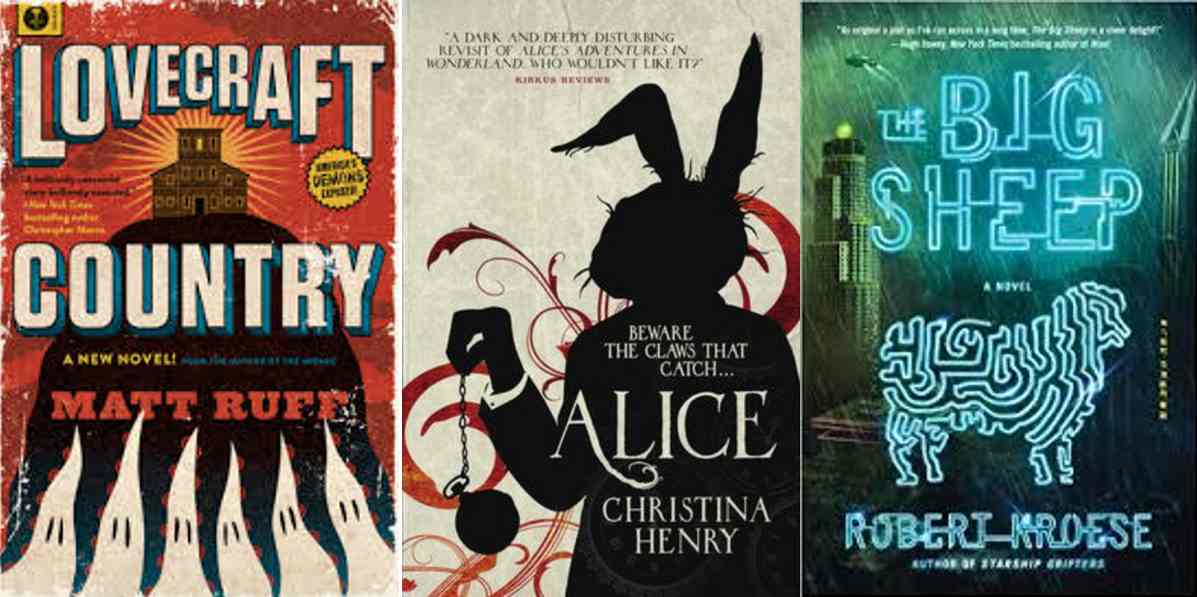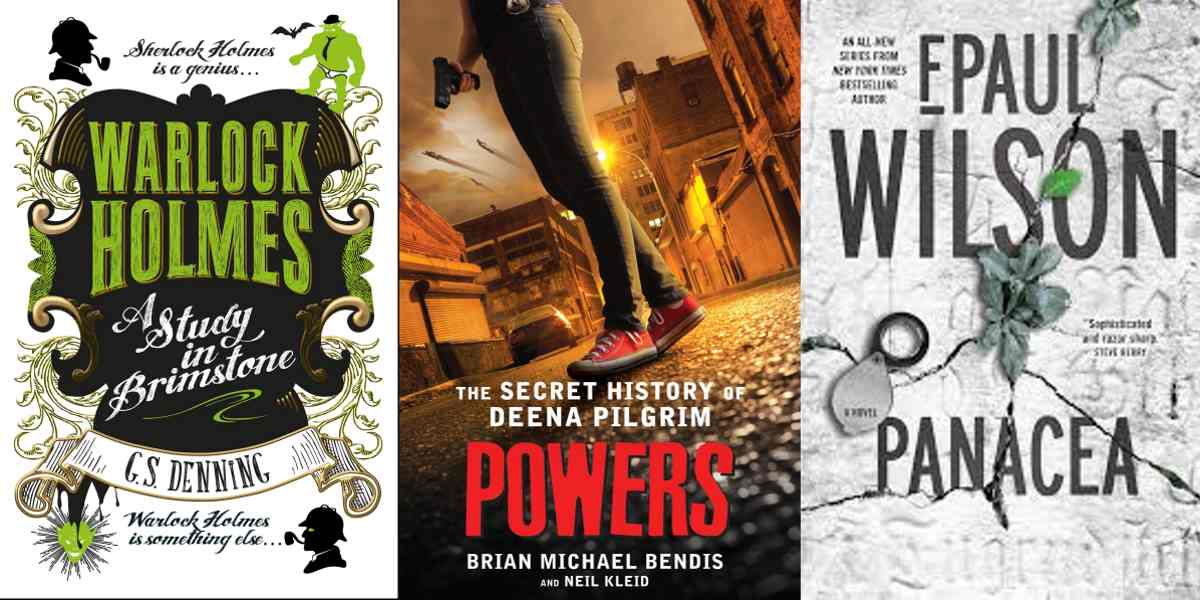 I’m not sure whether this is becoming a prevailing trend in fiction, but a number of my recent reads have been inspired, or influenced by, authors and novels that are already hugely popular. Whilst it’s certainly true that remakes dominate the movie theaters, I’m starting to wonder if perhaps the same is true of books.
I’m not sure whether this is becoming a prevailing trend in fiction, but a number of my recent reads have been inspired, or influenced by, authors and novels that are already hugely popular. Whilst it’s certainly true that remakes dominate the movie theaters, I’m starting to wonder if perhaps the same is true of books.
Continuing the legacy (or keeping the cash cow producing) is a new fiction model. In recent years, tried and tested authors have reincarnated old favorites, such as James Bond, Sherlock Holmes, and Hercules Poirot. Sherlock of course has a whole industry to himself, spawning countless new stories, versions, and spin offs. Zombifying classic books was a thing a few years ago, but holy water seems to have been poured on that particular flame. For which we can probably be thankful.
I’ve not read any of the official estate sanctioned books of classic franchises, but the books that have recently arrived through my letterbox have all been heavily under the influence of famous authors. Here are a few of the tastiest morsels I’ve been consuming.
Lovecraft Country by Matt Ruff (published by Harper), has, unsurprisingly, been influenced by the works of H.P. Lovecraft; not only Lovecraft’s work but also his political ideologies. Ruff previously tore into Ayn Rand in his 1997 work Sewer, Gas and Electric, and in this novel Ruff takes Lovecraft to task over his racist ideals.
Presented like a 1950s pulp novel, with the slogan “America’s Demons Exposed” emblazoned on the cover, Lovecraft Country is set during the time of Jim Crow America. I must confess, as my ethnicity is white British, I’m supremely ill-suited to reviewing this novel. I have almost zero understanding of the time and conditions Ruff is writing about. Nevertheless, such is the quality of Ruff’s writing: he puts you right there, as he lays bare the injustice of the Jim Crow laws and the arrogance and stupidity of white supremacists.
The novel is constructed from a series of short stories, all of which channel H.P. Lovecraft, featuring mysterious cults, dark rituals, and shadowy pacts. The tales follow Atticus Turner, as well as his friends and relatives, as they become embroiled in a feud between a family of plantation owners, come Outer-god summoning wizards.
Through the stories, Ruff examines the attitudes of the times and the trials faced by people of color in 1950s America. It’s a book that creeps up on you. I was a little disappointed after reading the first couple of stories, but with each story added, a sense of whole begins to emerge. By the time I reached the cataclysmic final tale, I was gripped.
Ruff is an idiosyncratic writer. His novels burst with off-the-wall ideas and imagery. The first book I read of his was Bad Monkeys, a bamboozling riot of conspiracy and clowns. All of his books are worth a look, including Lovecraft Country. Beneath the madcap creativity there is a strong sense of social justice, and an examination of human cruelty.
More cruelty can be found in Alice by Christina Henry (published by Ace in the US and Titan Books in the UK). The book is a dark reinvention of Lewis Carroll’s classic. We meet Alice incarcerated in a mysterious prison-cum-asylum in the “Old City”. The victim of an unspeakable crime when she was a young girl, Alice was locked her away by her parents for her inability to cope with the trauma.
Now imprisoned in a sadistic institution, her only company is a voice through the wall. The enigmatic “Hatcher” is her neighbor, and when the Jabberwocky attacks the prison, he rescues her and the two escape.
Alice was nominated for the Goodreads Choice Award for Best Horror. It is a brutal book and definitely not for a young audience. I’m not a huge fan of horror, and often find shock value is mistaken for suspense. There is an undoubted creepiness to Alice, but it is also full of extreme violence, particularly against women. It does often feel a bit gratuitous. Nevertheless, with her macabre reinvention of Carroll’s classic characters, Henry weaves an interesting tale.
Twisted versions of the Dormouse, Carpenter, Walrus, and Caterpillar all feature in Alice, as do classic moments such as “Eat me”. The Cheshire Cat is brilliantly reinvoked, and the White Rabbit becomes something sinister indeed. Alice is a tale of magic, redemption, and brutal axe murderers. The whole story could be viewed as grim metaphor for the way society treats mental illness, and the way in which women are treated generally. Certainly, it is not for the faint of heart.
The novel builds to an exciting conclusion, but ends in a way that is impossible to predict. Whilst complete in itself, room is left for the sequel, Red Queen. Whilst I didn’t unequivocally love Alice, it had enough about it to pull me through, and has left me wanting to explore more of Christina Henry’s peculiar reimagining.
No prizes for guessing the influences on Robert Kroese’s The Big Sheep (Thomas Dunne Books). This is a light-hearted detective noir set in a future L.A., after “The Collapse”, a cataclysm that has divided the city in two. There are two main strands to the story, one including the genre-essential femme fatale, the other, the eponymous enormous ovine.
Despite taking its cues from Chandler, the duo of detectives at the heart of the story are more Holmes and Watson than Marlowe. Erasmus Keane is a super-intelligent “phenomenonological investigator” who makes astounding deductions. The story is narrated by Keane’s bagman, Blake Fowler, a more grounded gumshoe, with a dry wit that comes straight from the Phillip Marlowe School of Acerbic Quips.
The plot of the The Big Sheep is an entertaining sci-fi whodunnit with nods to both Chandler and Philip K. Dick. There’s some curious science fictional shenanigans going on, that are a delight to reveal. The Big Sheep is a light but thoughtful read that will keep you guessing until the end. Like all good detective duos, there is plenty of scope for more capers, and whilst the central mystery is solved, The Big Sheep finishes on one hell of a cliffhanger.
 From L.A., and the phenomenonological investigator we move to Baker Street, London, and consulting detective, Warlock Holmes. A Study in Brimstone by G.S. Denning (Titan Books), is the lightest book on this list, and probably not one for Sherlock purists. Brimstone includes the oft-used inversion of a deductive Watson, and a more bumbling Holmes. In this version however, Holmes is a little more other-worldly. Along with Romanian vampire, Vladislav Lestrade, and Police Officer and ogre, Torg Grogsson, they investigate some downright peculiar goings on in Victorian London.
From L.A., and the phenomenonological investigator we move to Baker Street, London, and consulting detective, Warlock Holmes. A Study in Brimstone by G.S. Denning (Titan Books), is the lightest book on this list, and probably not one for Sherlock purists. Brimstone includes the oft-used inversion of a deductive Watson, and a more bumbling Holmes. In this version however, Holmes is a little more other-worldly. Along with Romanian vampire, Vladislav Lestrade, and Police Officer and ogre, Torg Grogsson, they investigate some downright peculiar goings on in Victorian London.
A Study in Brimstone is very entertaining. It’s funny, gently mocking it’s own audacious premise, as it parodies its source material. There are lots of references in the novel for Holmes fans to enjoy, and unlike many parody adaptations, the detective stories are good in themselves. Broken down into several shortish stories, much like the original Sherlock Holmes casebooks, there is much enjoy. A Study in Brimstone would make for quirky but perfect beach read. A sequel, The Battle of Baskerville Hall is due in 2017.
Despite the world’s love of superheroes you don’t get too many good superhero novels. I loved Superpowers by David Schwartz from a few years ago, and Austin Grossman’s, Soon I Will be Invincible is good too. Powers – The Secret History of Deena Pilgrim by Brian Michael Bendis and Neil Kleid (Published in the US by Thomas Dunne Books and in the UK by Titan books), is a spin off novel from the Playstation Network TV show, Powers, and from before that, Bendis’ comic book series of the same name.
Like many TV spin offs, Powers is a little uneven. It suffers from the common problem of trying to fill in back-story without belaboring the point, but not quite managing to do so. Such is the rich mythology of the original series, there’s quite a lot of explaining to do. I hadn’t seen or read any of the works the novel is based on, so most of this exposition was welcome, but it does slow things down, especially in the opening chapters.
Nevertheless, the story is a sound police-procedural-with-superpowers affair, that ticks lots of boxes from both sides of the genre divide. The end is genuinely surprising, and the power vs responsibility graph is given another examination to good effect. If you like superheroes, and edgy crime novels, this is for you.
Panacea by F. Paul Wilson (Tor Books), isn’t as influenced by other novelists to same degree as the other books mentioned in this piece, but in that alternate world where I write taglines, it would definitely be “Dan Brown meets Michael Crichton”.
We have a group of shadowy Catholics (Brown) hunting down a mysterious drug that apparently has the power to cure any illness. This vaguely scientific slant (Crichton) examines the ramifications of such a drug, and ponders whether it could be provided by science, God, or an unlooked-for third source.
Wilson’s prose is a little clunky, and most of his characters, archetypes, but he knows how to throw down a good story. This is compulsive reading, with a conspiracy edge, that channels Dan Brown, without ever becoming too preposterous.
Throughout the whole book, one can’t help but think, how amazing a cure-all would be (or even a cure-half). Amazing, but a curse. To posses such a thing, would be a superpower ranked very high on that power vs. responsibility line, I mentioned earlier. Wilson does a grand job of showing not telling here, leaving the reader to wrestle with his own conscience, about what they might do in a similar situation. Shiri Sondheimer examines this in her full review on GeekMom.
One other aspect I found intriguing, is the idea one of the characters has, that a disinterested caretaker holds the fate world in its hands. Panacea, apparently falls into a wider body of work that explores this idea in more detail. I’d never heard of Wilson until Panacea. I don’t think any of his many books are published here in the UK, but his entire output has an overriding theme. There’s an interesting double page spread at the end of Panacea about the interrelationships between his books. As a consumer of stories this idea fascinates me.
On the subject of off-world beings of great power, who may or may not visit Earth, according to Wilson’s Wikipedia entry one of his heaviest influences is H.P. Lovecraft. This great cosmic coincidence brings us nicely back to where we started, Lovecraft Country.
Disclaimer: I received review copies of all the books mentioned in this piece.




